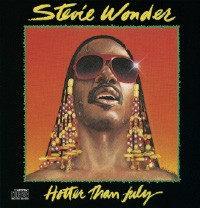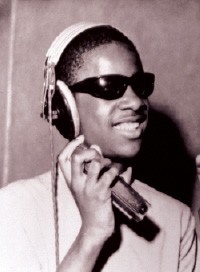Despite being blind since infancy and surviving the duel depredations of a hardscrabble east Detroit upbringing and child stardom to become one of the most celebrated pop musicians in recorded history, Steveland Judkins “Stevie Wonder” Morris doesn’t have a biography that can match the torment or weirdness of Ray Charles, James Brown, Al Green, Prince, or Michael Jackson. And, right, he missed out on the mythologizing that early death provided to Sam Cooke, Otis Redding, and Marvin Gaye.
Like his onetime Motown elder Smokey Robinson, he’s a relative normal (no, I haven’t forgotten about Journey Through the Secret Life of Plants) and a lifer whose music suggests those rather unexciting qualities. And also, right, a genius.
These days, Wonder is too often thought of — when thought of at all — as the Grammy-certified embodiment of middlebrow respectability: neither a hip-hop/neo-soul touchstone (like Gaye) nor a totem of crossover hip (like Brown).
But who else in soul/R&B has produced a deeper, more wide-ranging catalog? And how many can match his longevity? No other R&B artist who was making notable pop music when Wonder debuted, at age 12, with 1963’s “Fingertips (Part 2)” was still much of a factor well into the ’80s, much less 2005. That was when Wonder released the unexpectedly solid A Time To Love, his first proper studio album in a decade and an album that, aside from its few nods to hip-hop, could have been released in 1977 without sounding terribly out of place.
Wonder’s embrace of the middlebrow genteel — and its even more fervent returning affection — made him an institution during his fecund adult prime in the ’70s and well into an ’80s now best remembered for his soupy but somewhat underrated soundtrack smash “I Just Called To Say I Love You.” But that reputation overshadows how much of a politically tough-minded, musically idiosyncratic groove machine he was at his peak. And, perhaps just as much as the larger social forces coming to bear, he was the primal force that changed Motown, musically and in a business sense, in the incredibly fertile five-year period (1971-1976) after he turned 21 and seized control of his career, culminating with the overreaching but often brilliant double-record-and-then-some Songs in the Key of Life.
Some highlights of a discography ripe for rediscovery:
Love songs: Pre-emancipation Motown singles “I Was Made To Love Her” and “Signed, Sealed, Delivered” are well-oiled vehicles for Wonder’s irrepressible and — by Motown’s early standards — nearly chaotic vocal performance. But Wonder’s best love songs might be those that bookend what is, despite the elevated reputations of Innervisions and Songs in the Key of Life, his best album, 1972’s Talking Book. The opening “You Are the Sunshine of My Life,” its synth-and-bongos intro the unlikely sound of a waking epiphany, might be the most wholly beautifully record he ever made. The closing “I Believe (When I Fall in Love It Will Be Forever)” is a romantic hymn hypnotic in its repetitions.
Political songs: Aside from an early, Motown-mold-breaking Dylan cover (“Blowin’ in the Wind”), the then-19-year-old Wonder made his first foray into political pop with 1970’s “Heaven Help Us All,” singing someone else’s words over too-intrusive gospel-styled backing vocals and making them sound a lot tougher and smarter than they really were. On his own after that, Wonder proved a more astute commentator. Innervisions‘ “Living for the City” is an epic, personalized allegory for the civil rights movement that makes pained acknowledgement of its lost momentum. Wonder then devoted the second strongest synth riff of his career to the Nixon-era admonishment “You Haven’t Done Nothin’,” a fed-up lament that’s lost little bite or relevance in subsequent decades.

Groove records: With the possible exception of Wonder-inheritor Prince, there may not be a modern R&B musician who so fully absorbed the variety of the black music canon. With its sassy, swinging horn fanfare, shout-outs to the greats (adding Glenn Miller to Ellington, Basie, and Armstrong), and joyful interjections from Wonder himself, “Sir Duke” captures this better than anything, though Wonder would extend his jazz tribute across 10 minutes of “Do I Do” with Dizzy Gillespie on trumpet. “Boogie On Reggae Woman” was a fruitful nod to the Jamaican contribution to the black pop diaspora, but Wonder topped it with 1980’s “Master Blaster (Jammin’),” still probably the best non-Jamaican reggae record ever. “Higher Ground” is a funk workout not even the Red Hot Chili Peppers could ruin. And on Talking Book‘s “Maybe Your Baby,” Wonder multi-tracks his own vocal into a trance-like rhythmic abstraction.
Devotional songs: Vocally, musically, and philosophically, Wonder may have been soul music’s least gospel-influenced star, at least through his own prime years. Songs in the Key of Life opens like Sunday morning, with the one-man-backing-choir of “Love’s in Need of Love Today” and the personal devotional “Have a Talk With God.” But, more often, Wonder found the spiritual in the form of others: Martin Luther King Jr. on the joyous “Happy Birthday,” a special someone who spurs contentment on the lovely “For Once in My Life,” and, most of all, a newborn daughter on “Isn’t She Lovely?”
Visionary, mystical, or otherwise beyond classification: “Uptight (Everything’s Alright)” probably rivals latter Motown discovery Michael Jackson’s (and the Jackson Five’s) “I Want You Back” as the greatest kid-pop ever recorded. A 15-year-old Wonder runs roughshod over a locomotive Motown groove, yelping, “Got empty pockets, you see, I’m a poor man’s son!” at the climax of a conventional poor-boy-rich-girl love story turned into something more. “Visions” is Wonder’s ultimate testament of faith in this world, more affecting for how matter-of-fact it is, a blind man’s meditation on the certainty of leaves changing from green to brown. And “Superstition” is probably one of the greatest pop records: such a tough, gritty, and synthesized groove paired with an equally tough, questioning lyric about religion (“You believe in things you don’t understand, then you suffer”) that it would take more than a decade for another black pop musician to take up.